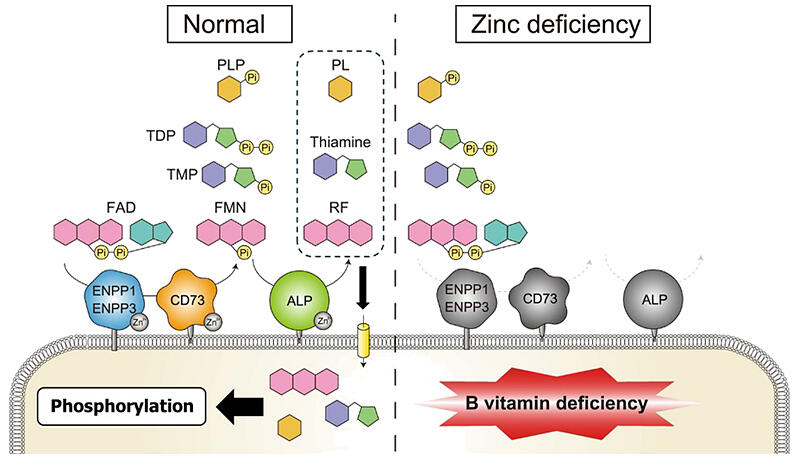Vitamins B1, B2, and B6 are essential micronutrients involved in various biological reactions in cells, but they are active only in their phosphate esters or nucleotide forms (phosphate ester forms). Meanwhile, B vitamins in this form cannot penetrate cells across the cell membrane. After hydrolysis of the phosphate ester occurs before transportation across the membrane and B vitamins are taken into the cells, they are again transformed into their phosphate ester forms that can be used in the body. Previous studies have suggested that zinc-dependent enzymes are involved in phosphate ester hydrolysis, but the exact mechanism of action was yet to be clarified.
Using cultured cells and rats, a research team made up of Associate Professor Taiho Kambe, Graduate Student Hana Yuasa (at the time of the study), Assistant Professor Katsutoshi Nishino (currently a senior assistant professor at Tokyo University of Technology), and Professor Masaya Nagao of the Graduate School of Biostudies at Kyoto University, Assistant Professor Takamasa Kido and Professor Machi Suka of the Jikei University School of Medicine, and Professor Tsutomu Fukuwatari of the University of Shiga Prefecture, has demonstrated that four zinc-dependent enzymes play important roles in the B vitamin phosphate ester hydrolysis and that zinc nutritional status has major effects on the hydrolytic activity of these enzymes. The results clearly indicate the importance of zinc in B vitamin metabolism. The study was published in The FASEB Journal.

Extracellular FAD is hydrolyzed to FMN by CD73, ENPP1, and ENPP3. FMN is hydrolyzed to RF (VB2) by TNAP (IAP and PLAP) on the plasma membrane and in the extracellular space in the normal status. Extracellular PLP and TDP-TMP are also hydrolyzed to PL and thiamine (VB6 and VB1) by TNAP (IAP and PLAP). The generated RF, PL, and thiamine are taken up into the cytosol across the plasma membrane through specific transporters (left). The activities of these zinc enzymes are reduced under zinc deficiency. Consequently, the rate of hydrolysis of FAD and FMN to RF, PLP to PL, and TDP-TMP to thiamine is reduced (right), which likely results in the reduced uptake of B vitamins. This suggests that zinc deficiency may affect B vitamin deficiency and that the symptoms of B vitamin deficiency may mimic those of zinc deficiency.
Provided by Kyoto University
The research team has previously analyzed zinc transporters, which play a role in zinc absorption from the gastrointestinal tract and in supplying zinc to zinc-dependent enzymes. During the course of their previous study, the research team noted that zinc-dependent enzymes localizing and functioning extracellularly and in the plasma membrane hydrolyze phosphate ester forms of various compounds and that hydrolysis of the phosphate ester forms is important for the penetration of several nutrients into cells across the plasma membrane.
In particular, vitamins B1, B2, and B6 are nutrients of which absorption and metabolism require hydrolysis of their phosphate ester forms. In this study, the research team attempted to identify the enzymes involved in these hydrolysis reactions. They caused overexpression of each of the 15 enzymes predicted to be involved in the hydrolysis of the phosphate ester forms and analyzed their hydrolytic activity using HPLC. The result revealed that four zinc-dependent enzymes, ALP, CD73, ENPP1, and ENPP3, play important roles.
In a previous study, the research team found that the activity of these four zinc-dependent enzymes is sharply reduced in response to zinc deficiency. Therefore, they analyzed the relationship between zinc nutritional status and hydrolysis of B vitamin phosphate ester forms using cells cultured under various zinc conditions and serum from rats fed a zinc-deficient diet and found that the hydrolysis activity was greatly reduced by zinc deficiency. These results clearly indicate that B vitamin metabolism is greatly affected by zinc nutritional status. In other words, maintaining adequate zinc nutritional status is important in B vitamin metabolism.
Kambe said, "It is thought that more than 500 zinc-dependent enzymes are at work in the human body. These enzymes do not uniformly lose activity upon zinc deficiency. Rather, we know that they can be classified into two groups: enzymes whose activity is more susceptible to zinc deficiency and enzymes whose activity is less susceptible. The enzymes ALP, CD73, ENPP1, and ENPP3 identified in this study are the enzymes whose activity is most susceptible to zinc deficiency. Thus, metabolic systems such as B vitamin metabolism, in which these four enzymes are involved, are expected to be involved in various cases of zinc deficiency. We hope to continue to reveal more details about the interactions between vitamins and minerals, two classes of important physiologically active substances, and present findings that will help maintain and promote good health."
Journal Information
Publication: The FASEB Journal
Title: Rate of hydrolysis of the phosphate esters of B vitamins is reduced by zinc deficiency: In vitro and in vivo
DOI: 10.1096/fj.202401207R
This article has been translated by JST with permission from The Science News Ltd. (https://sci-news.co.jp/). Unauthorized reproduction of the article and photographs is prohibited.




